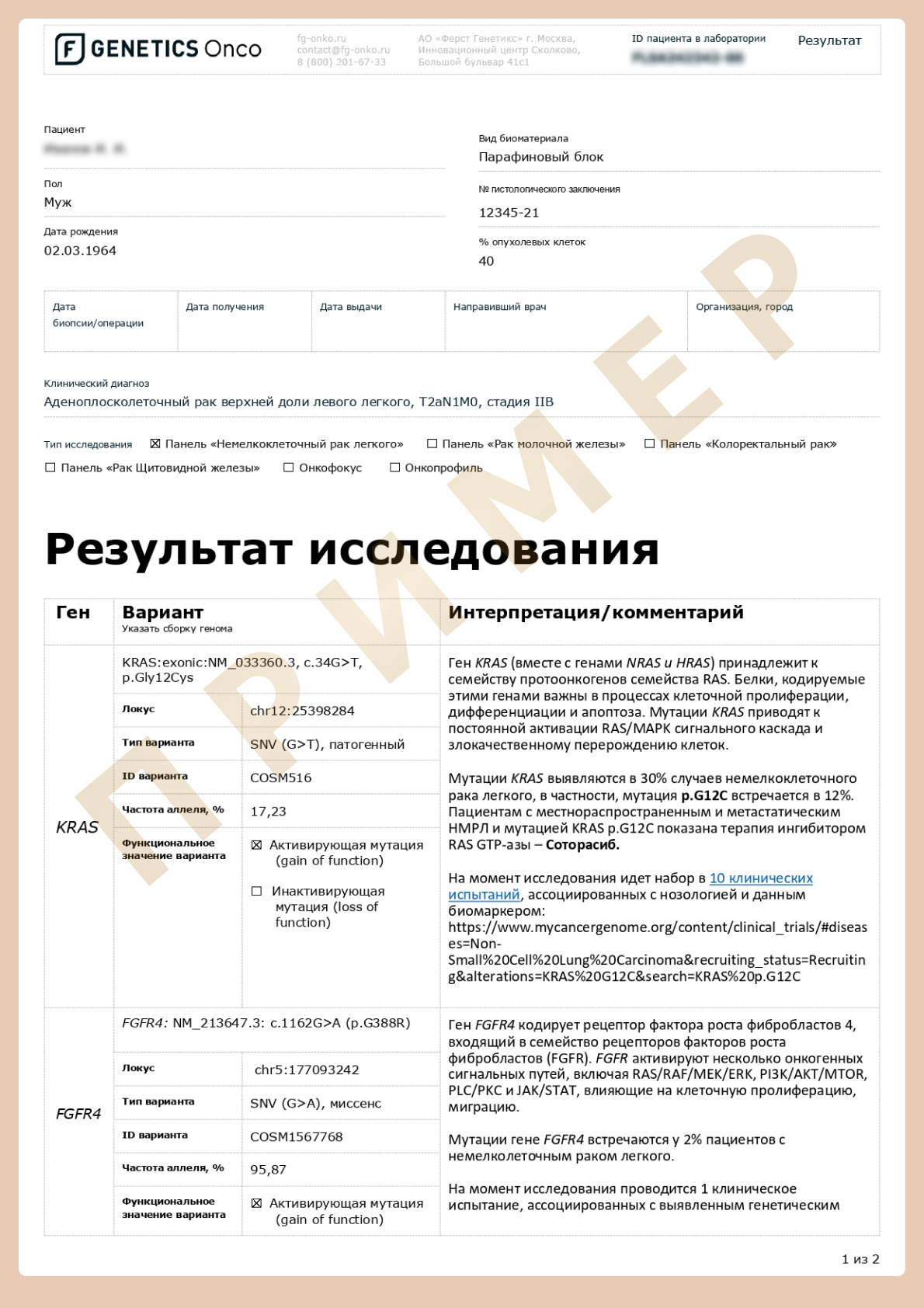
Genetic testing for non‑small cell lung cancer (NSCLC)
Up to 85% of lung cancers are NSCLC. Adenocarcinoma, squamous cell carcinoma, and large cell carcinoma are the main subtypes of NSCLC.
Even though these histology subtypes have different origins, they are classified as NSCLC because the treatment, management, and prognosis are often similar.
What is Genetic testing for NSCLC?
An NGS-based assay includes a panel of genes concurred with the clinical use of approved targeted drugs and drugs from prospective clinical trials for NSCLC.
Alterations in these genes lead to tumor development and are used as diagnostic, prognostic, and predictive cancer markers.
"First Genetics Lab" performs testing using the high‑throughput sequencing system named "F‑Genetics" and reagents for high‑throughput next generation sequencing (NGS) of genes associated with human cancer genesis, that are registered as medical devices (Federal Service for Surveillance in Healthcare: РЗН 2020/10521, РЗН 2022/16970)
The assay detects:
- Hotspots (SNV/InDels)
- Copy number variations (CNV)
- Chromosomal aberrations (Gene fusions)
Indications for testing
For patients diagnosed with NSCLC for:
- Therapy selection
- Therapy monitoring and correction if the cancer recurrence occurs
- Clinical trials enrollment
Targeted therapy
Targeted therapy is the type of treatment that targets specific molecules/proteins on the cancer cell surface or inside the cancer cells, blocking the growth and spread of cancer cells and limiting damage to healthy cells.
Not all tumors have the same targets. Genetic tests are used to find out what treatment is the most effective. Many clinical studies are underway.
Targeted therapy. Indications for drugs
TARGETED THERAPY FOR ADVANCED OR METASTATIC NSCLC
(NCCN Guidelines Version 3.2022)
| First-line therapy | Subsequent therapy |
|---|---|
|
EGFR Exon 19 Deletion or L858R
|
|
|
Afatinib
Erlotinib
Dacomitinib
Gefitinib
Osimertinib
Erlotinib + ramucirumab
Erlotinib + bevacizumab (nonsquamous)
|
Osimertinib
|
|
EGFR S768I, L861Q, and G719X
|
|
|
Afatinib
Erlotinib
Dacomitinib
Gefitinib
Osimertinib
|
Osimertinib
|
|
EGFR Exon 20 Insertion Mutation Positive
|
|
|
Amivantamab-vmjw
Mobocertinib
|
|
|
KRAS G12C Mutation Positive
|
|
|
Sotorasib
|
|
|
ALK Rearrangement Positive
|
|
|
Alectinib
Brigatinib
Ceritinib
Crizotinib
Lorlatinib
|
Alectinib
Brigatinib
Ceritinib
Lorlatinib
|
|
ROS1 Rearrangement Positive
|
|
|
Ceritinib
Crizotinib
Entrectinib
|
Lorlatinib
Entrectinib
|
|
BRAF V600E Mutation Positive
|
|
|
Dabrafenib/trametinib
Dabrafenib
Vemurafenib
|
Dabrafenib/trametinib
|
| First-line therapy | Subsequent therapy |
|---|---|
|
NTRK1/2/3 Gene Fusion Positive
|
|
|
Larotrectinib
Entrectinib
|
|
|
MET Exon 14 Skipping Mutation
|
|
|
Capmatinib
Crizotinib
Tepotinib
|
|
|
RET Rearrangement Positive
|
|
|
Selpercatinib
Pralsetinib
Cabozantinib
|
|
EMERGING BIOMARKERS TO IDENTIFY NOVEL THERAPIES FOR PATIENTS WITH METASTATIC NSCLC
| Genetic Alteration | Available Targeted Agents with Activity Against Driver Event |
|---|---|
| MET amplification ( 10 copies and more) |
Crizotinib
Capmatinib
Tepotinib
|
| ERBB2 (HER2) |
Ado-trastuzumab emtansine
Fam-trastuzumab deruxtecan-nxki
|
NGS method
NGS can simultaneously read hundreds of millions of short sequences of DNA and detect all types of mutations, including

Hotspots (SNV/InDels)

Copy number variations (CNV)

Chromosomal aberrations (Gene fusions)
Advantages
- High sensitivity and specificity of the method
- Fast turnaround time
- Simultaneous detection of all types of mutations, including chromosomal aberrations
- Minimum requirements for sample quantity and quality
- Shorter testing times
How to request the genetic testing for NSCLC?
Download and fill out the informed consent form
A courier will collect histological material and take it to the laboratory free of charge.
First Genetics Laboratory
Specialists
Years of experience in genetics, laboratory diagnostics and bioinformatics
Confidentiality
All data is strictly confidential and cannot be passed on to third parties
Time frame
Results ready in a short time
Security
Extensive control at each stage of testing
No delivery fees
Free delivery of biomaterial across Russia
Charities
Email info@f-genetics.com for information


